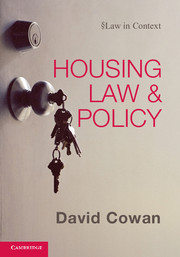Book contents
- Frontmatter
- Contents
- Preface
- List of abbreviations
- Table of legislation
- Table of international instruments
- Table of cases
- 1 Locating housing law and policy
- Part I Regulation of housing tenure
- Part II Access to housing
- Part III Rights and responsibilities
- 11 Security of tenure
- 12 Harassment and unlawful eviction
- 13 Property state and condition
- 14 Arrears
- 15 Anti-social behaviour
- 16 Mandatory possession proceedings
- Postscript
- Bibliography
- Index
16 - Mandatory possession proceedings
from Part III - Rights and responsibilities
Published online by Cambridge University Press: 05 June 2012
- Frontmatter
- Contents
- Preface
- List of abbreviations
- Table of legislation
- Table of international instruments
- Table of cases
- 1 Locating housing law and policy
- Part I Regulation of housing tenure
- Part II Access to housing
- Part III Rights and responsibilities
- 11 Security of tenure
- 12 Harassment and unlawful eviction
- 13 Property state and condition
- 14 Arrears
- 15 Anti-social behaviour
- 16 Mandatory possession proceedings
- Postscript
- Bibliography
- Index
Summary
In a range of possession proceedings, provided the landlord has complied with relevant formalities, the judge must make an order for possession. These are mandatory cases, so that the judge’s role is, in essence, procedural rather than substantive. At least, that used to be the case and it is likely still to be true in many cases. However, a substantive issue has emerged, partly as a result of the incorporation of the European Convention on Human Rights into English law in the HRA. That the UK has been a signatory to the Convention since its foundation, but this issue has only really emerged relatively recently, may have been a question of jurisdiction and, simply, proximity (bringing rights back home, the government’s strapline for the HRA, focused minds on their ambit). The nearer the jurisdiction is to national law, the more influential it is likely to be; and, indeed, in mandatory possession proceedings, it has been influential. The central question concerns the extent to which such proceedings must have reference to proportionality. This derives from Article 8 of the European Convention and Sch. 1, HRA. It is in these terms:
Right to respect for private and family life
Everyone has the right to respect for his private and family life, his home and his correspondence.
There shall be no interference by a public authority with the exercise of this right except such as is in accordance with the law and is necessary in a democratic society in the interests of national security, public safety or the economic well-being of the country, for the prevention of disorder or crime, for the protection of health or morals, or for the protection of the rights and freedoms of others.
Proportionality derives from the question of whether such proceedings are ‘necessary in a democratic society’ (para. 2). Generally, such proceedings are ‘in accordance with the law’, because they are in accordance with statutory provisions or the common law, and so that point is conceded.
- Type
- Chapter
- Information
- Housing Law and Policy , pp. 378 - 406Publisher: Cambridge University PressPrint publication year: 2011



